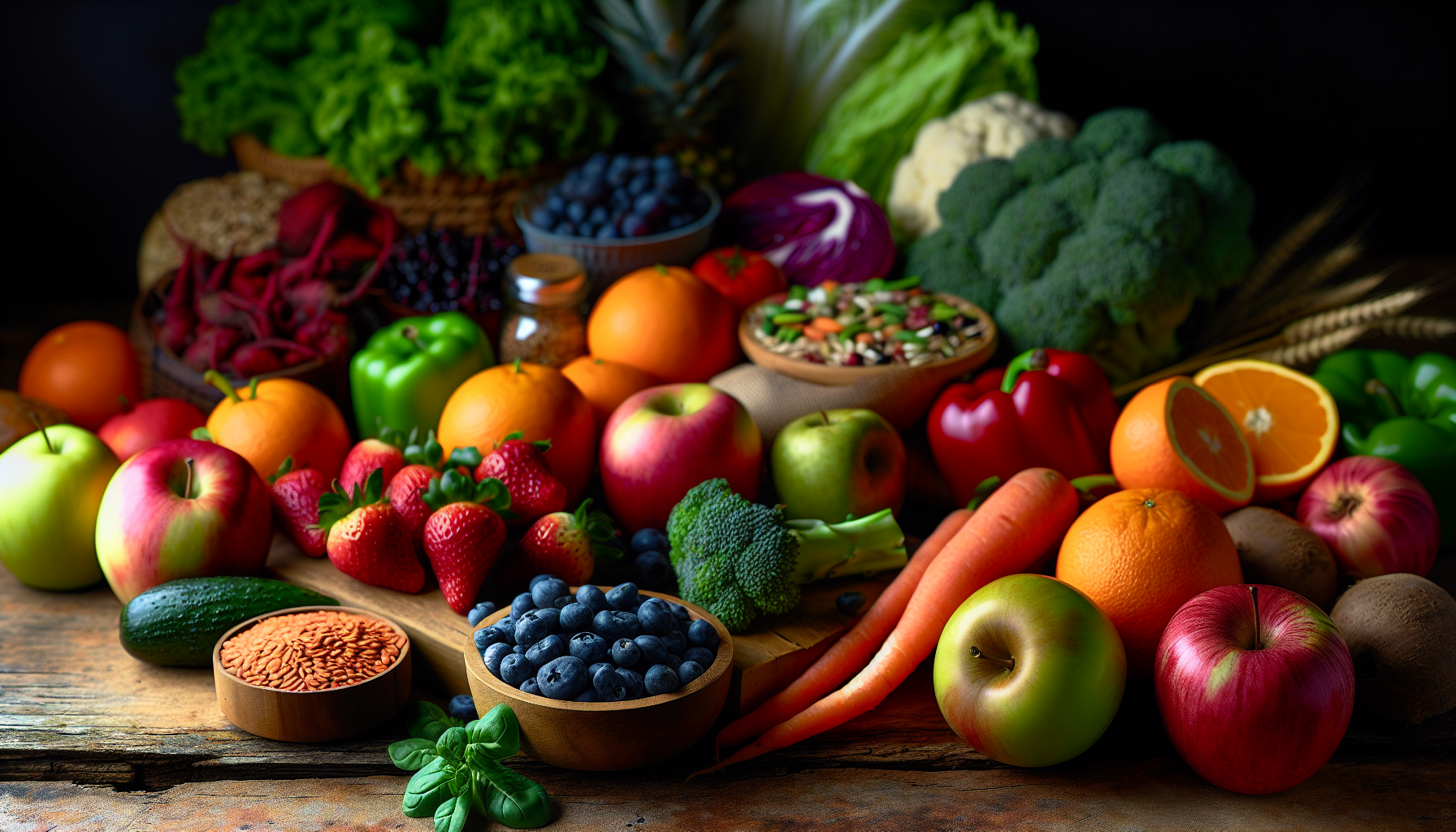5 Sustainable Weight Loss Strategies That Really Work
Embarking on a weight loss journey doesn’t have to mean resorting to drastic measures like crash diets, extreme workout regimes or taking GLP-1 agonists. In fact, sustainable weight loss is rooted in adopting healthy lifestyle changes that focus not only on diet and physical activity, but also mindful eating patterns, hydration, sleep, and setting attainable goals. These holistic strategies can help foster a healthier relationship with food, improve overall health, and facilitate long-term weight loss plans and management. Let’s explore five sustainable weight loss strategies that really work.
Key Takeaways
A balanced diet supports weight loss, incorporating adequate protein, healthy fats, complex carbohydrates, and fiber-rich foods to enhance satiety and prevent overeating.
Regular physical activity, including a combination of cardio and strength training exercises, is critical for burning excess calories and maintaining muscle mass during weight loss. Polyphenol supplementation may support this.
Mindful eating, staying hydrated, obtaining sufficient sleep, and setting realistic weight loss goals are all essential components that contribute to a sustainable weight loss strategy.
GLP-1 agonists can be used as a short-term solution for weight loss, as they help to regulate appetite and insulin levels, but they should not replace a balanced diet and regular physical activity in a sustainable weight loss strategy.
Creating a Balanced Diet for Weight Loss
Feast your eyes on this vibrant array of nature's bounty - a colorful medley of fruits, vegetables, and whole grains. Each item tells a story of health and vitality. The crisp apples, freshly picked from the orchard, whisper tales of sweet, juicy bites. The array of vegetables, from the robust broccoli to the crunchy carrots, narrate stories of nourishment and vitality. The whole grains, strong and versatile, recount tales of hearty meals that fuel the body. Together, they weave a beautiful narrative of a balanced diet and wholesome nutrition, serving as a reminder of the importance of diversifying our food intake for optimal health.
Losing weight is strongly correlated with healthy eating, and exercise habits too. To achieve your weight loss goals, a balanced diet consisting of nutrient-dense foods should be adopted in order to prevent gaining more and promote satisfaction while on the journey. Opting for nutritious meals rather than going down the fad diet route is important so you can enjoy as well as succeed at dropping those pounds.
Understanding what makes up a dietary pattern and eating patterns that supports successful slimming down involves knowing just how many calories is crucial it is not only to each food group consume nutritiously but also avoid added sugars and fat buildup by avoiding unhealthy food choices. A healthy plate full of varied produce including fruits, vegetables and proteins will give you all the elements required for losing weight effectively without compromising nutrition or taste!
Protein sources
Protein is deemed as a foundational element of life and an essential macronutrient when it comes to managing weight. It has proven useful in assisting with successful shedding of extra pounds, by regulating hormones, speeding up metabolism, preventing muscle loss, satisfying cravings and more! Incorporating the suggested amount (0.8 grams per kilogram bodyweight) into one’s diet can facilitate their journey towards losing weight optimally.
For your protein needs while on a weight loss journey, consider a variety of sources. These include fish like salmon, poultry like turkey, nuts such as almonds and walnuts, and beans including kidney beans and tofu. Don't forget lentils or chickpeas. Even broccoli, a vegetable from the cruciferous group, is a great source of protein. These sources not only provide the necessary protein for effective weight loss but also offer a host of other health benefits.
Healthy fats
It’s a misconception that all fats are bad for you. There is some truth in the fact that plant-sourced oils, like olive oil and fish, have advantageous healthy fats which can aid a healthy weight loss plan. It must be kept with calorie restriction in mind. To keep an eye on just how many calories of these particular fat types one consumes because they also carry high calorie density. Keeping caloric intake within limits will support any desired changes regarding body mass too.
Complex carbohydrates
Incorporating a range of whole grains such as brown rice, quinoa and oats, as well certain foods such as starchy vegetables like potatoes or sweet potatoes into one’s diet can help in managing weight more effectively. This is because these complex carbohydrates are digested slowly, which leads to having fewer calories while providing sustained energy and increased feelings of fullness compared to simple sugars found in sugary foods.
Fiber-rich foods
For individuals aiming to eat less to shed weight, fiber-rich foods can be beneficial. These kinds of food include fruits, vegetables, legumes and nuts which help promote fullness while curbing appetite. Thereby stopping overindulging in eating.
Fulfilling the daily recommendation for dietary fibers will benefit your goals regarding losing extra pounds.
The advantages that these types of foods have on weight loss are remarkable: they make you feel fuller faster so as to avoid over-consuming calories when trying to lose weight fast, and reduce body mass index (BMI).
Cutting Down on Processed Foods for Weight Loss
Processed foods, including canned goods, frozen meals, and snacks, often contain unhealthy ingredients that can thwart your weight loss efforts. They're typically high in calories but low in nutrients, which can lead to overeating.
Transitioning to a diet rich in whole foods like fruits, vegetables, lean proteins, and whole grains can support your weight loss journey. These foods are nutrient-dense and high in fiber, helping you feel satisfied longer.
Becoming adept at reading food labels can help you identify and avoid processed foods. Look for products with few, recognizable ingredients and avoid those with added sugars, unhealthy fats, and high sodium levels.
Similarly, processed beverages, such as soda and energy drinks, can be obstacles to weight loss due to their high sugar content. Opt for water, herbal teas, or homemade smoothies instead.
Incorporating Physical Activity into Your Lifestyle
Meet Jane, an avid jogger who finds peace in nature. Each dawn, she sets off on a run through a vibrant forest, the symphony of the wilderness keeping her company. Her path takes her past a babbling brook and wildlife, reminding her of the thriving life around her. Jane's routine is more than exercise; it's a spiritual journey that connects her to the world around her. As she completes her run, she feels invigorated and ready to face the day ahead. Jane's daily jog is a testament to the power of nature in fostering physical health and mental well-being.
Achieving a healthy weight involves incorporating physical activity into your lifestyle. Regular workouts can aid in reducing extra calories, aiding with sustainable results and even raising mood levels. One of the most efficient ways to reduce body mass is by combining aerobic exercises along with strength training, which creates an all-encompassing regimen centered on burning fat cells, not just counting energy intake.
It’s important for anyone aiming at reaching their weight loss goals to understand different forms of exercise beneficial when looking towards shedding excess pounds or maintaining already lost ones through a healthy diet plan.
Cardio exercises
For those looking to shed some weight, cardio exercises can be a great asset. These activities are known for burning more calories, and reducing body fat while also promoting cardiovascular health. From HIIT or High-Intensity Interval Training sessions to running, rowing and cycling, there are no shortage of exercise options available out there!
To help you lose weight more quickly, it’s important that you consume fewer calories than the amount you burn off through physical activity. Strike this balance correctly and you’ll start to lose body fat and seeing positive results in no time!
Strength training exercises
Weight loss goals can be achieved by incorporating strength training exercises such as pull-ups, squats and push-ups into your routine at least three to five times a week. Doing so will not only help you build muscle with a higher calorie burning capacity than fat, but also increase daily caloric expenditure. Consequently, helping reduce weight while still preserving muscular strength.
Finding activities you enjoy
Maintaining an active lifestyle is key, and to make it sustainable you should enjoy the physical activities. Identify what makes you happy - if it’s a nature walk or playing badminton, dancing maybe, and ensure that these become regular parts of your regime.
Mindful Eating Techniques for Weight Management
Meet Emily, a woman on a journey of mindful eating. Each mealtime, she takes a moment to appreciate the vibrant colors of her fresh salad, the crunch of the lettuce, the juicy burst of the cherry tomatoes, and the tangy vinaigrette dressing. Each bite is a symphony of flavors, a testament to nature's bounty. Emily takes her time, savoring each mouthful, truly tasting her food rather than mindlessly consuming it. She listens to her body, eating when she's hungry, and stopping when she's full. This practice of mindful eating has not only helped Emily in her weight loss journey but also transformed her relationship with food. She now finds joy in the simple act of eating, turning each meal into a mindful, nourishing experience.
Mindful eating is a great way to manage your weight by developing better habits around food. This technique calls for you to be aware of what you eat and drink and how much you are consuming during meals, tuning in with hunger and fullness signals so that enjoyment can be taken from each bite.
This skill assists with overeating while creating the foundations necessary for an overall balanced diet that brings wellbeing, these same basics fuel any successful healthy eating plan as well.
Slowing down while eating
The practice of mindful eating involves slowing down while consuming food in order to prevent weight gain. Research has shown that rapid consumption can contribute to a person’s overall mass, so taking time when chewing meals and having pauses between bites can aid digestion, increase enjoyment during mealtime, as well as protect against overeating.
Listening to your body's signals
Mindful eating entails paying attention to what your body is communicating when it comes time for you to eat. It’s key to recognize the distinction between physical and emotional hunger, so that sound decisions about food can be made and overeating avoided. Eating slowly permits at least twenty minutes before the stomach signals fullness. Thus, allowing your system sufficient opportunity to process the meal appropriately.
Eliminating distractions during meals
To practice mindful eating, one should strive to limit distractions during meals like watching TV. By creating a tranquil environment with no TVs or phones present, it can be easier to concentrate on the food and recognize when you’ve had enough so as not to overindulge. Establishing this peaceful atmosphere for your mealtimes is an important aspect of conscious consumption.
Importance of Hydration in Weight Loss
Meet Sarah, embracing the simplicity and rejuvenation of a glass of lemon-infused water. This refreshing beverage not only quenches her thirst but also aids in her weight loss journey by boosting her metabolism and keeping her hydrated throughout the day.
Avoid sugar sweetened beverages. One of the most frequently overlooked aspects in regards to shedding weight is proper hydration. Water plays a crucial role in boosting metabolic rate, reducing appetite and burning fat. All factors contribute significantly towards successful weight loss. So what kind and how much water should one drink each day? Are there any alternative low-calorie drinks out there? Here’s more information on this subject matter!
How much water to drink
The suggested amount of water intake per day is based on your body weight. It should be about half the pounds you weigh in ounces. For example, someone who weighs 180 lbs would want to aim at drinking 90 ounces a day. These needs vary due to different factors like age, gender and how active one’s lifestyle is physically.
Low-calorie drink options
Adding water to your diet is a great start. There are other low-calorie beverages you can try as part of an overall healthy lifestyle. For instance, green tea offers the potential for weight management through increased calorie burning and fat oxidation. Coconut water provides natural electrolytes while vegetable juices offer hydration without much in terms of calories consumed. All these beverage options could be just as beneficial when considering adding more nutrition into one’s diet along with healthier foods focused on weight control and decreasing caloric intake levels.
Recognizing signs of dehydration
Hydration is essential when it comes to your weight loss plan, as recognizing the warning signs of dehydration should be taken seriously. These include intense thirst, infrequent urination with dark-colored urine, tiredness, dizziness and confusion. When dehydrated for a long period of time, your body can’t metabolize food or burn fat properly, which will slow down any progress you’re making in regard to losing weight. Proper hydration plays an important role in this process by allowing our bodies maximum function potential so we may achieve successful results quicker!
The Role of Sleep in Weight Loss and Overall Health
Welcome to the serene oasis: a comfortable bedroom environment designed for quality sleep. This tranquil space, with its soft lighting and calming decor, invites rest and relaxation, promoting a restful night's sleep essential for weight loss and overall health.
The connection between sleep and managing weight is indisputable. Not having enough rest can result in a gain of excess pounds, while proper shut-eye helps to regulate hormones that influence cravings, rev up metabolism, and prevent increases on the scale.
Let’s delve deeper into this relationship: getting adequate sleep impacts our ability to lose weight and maintain healthy bodyweight as it affects several key processes linked with successful dieting or slimming down efforts. Sleep deprivation has been known to impair these strategies to lose weight by triggering unhealthy eating habits due to hormonal fluctuations and slower metabolisms which usually lead back up the scales again faster than before attempting to lose weight or body fat through any sort of dietary regime.
Sleep and hormone levels
Your weight loss goals can be significantly affected by the way you sleep. Hormones like growth hormone, melatonin, cortisol, leptin and ghrelin play an important role in managing appetite levels as well as metabolism. Obtaining enough rest will help to maintain these hormones, which could support your aim of shedding those excess pounds.
Hence it is crucial that one gets enough hours of shut-eye each night to aid in balancing out these vital hormones for successful long term outcomes with regards to reaching their ideal body weight goal or objectives.
Sleep deprivation risks
Sleep deprivation can be a major hindrance to any progress made on the path of weight loss. It has been found to lead to increased cravings for unhealthy, high-calorie foods and decreased control over appetite due in part to worsened stress levels which compromises optimal health and successful management of bodyweight.
Tips for improving sleep quality
Achieving better sleep is essential in order to support weight loss objectives. To help improve your sleep quality, here are some suggestions.
Establish a consistent sleeping schedule and adhere to it daily.
Participate in physical activity every day. This can range from simple walks or stretching exercises to going for a run at the park - all that matters is you’re up and moving around!
Aim for balance when planning meals by including fiber-rich foods such as whole grains, fruits, vegetables, legumes etc., which will also contribute towards overall health benefits too!
Following these tips should assist greatly with improving one’s natural circadian rhythm while working on their weight reduction goals simultaneously - there might even be additional relaxing activities like deep breathing routines as well yoga/meditation sessions right before bedtime if needed, which could Upgrade the quality of slumber obtained per night.
Setting Realistic Weight Loss Goals and Staying Motivated
Meet John, a man dedicated to setting realistic weight loss goals and staying motivated. With a clear vision of his desired body, a plan in place, and a burning desire to succeed, he's ready to tackle his weight loss journey head-on. His determination and commitment are an inspiration to us all.
It is important to set realistic weight loss goals and remain motivated for successful, long-term results. A healthy amount of weight loss each week can range between 0.5-2 pounds if a balanced diet and adequate exercise are maintained.
For your own personal journey towards reaching these objectives, there are some strategies which can be applied in order to achieve those desired outcomes. This includes setting achievable targets as well as keeping the motivation high throughout it all! Eating healthily, regularly exercising and staying focused on one’s purpose will create an effective sustainable pathway when aiming for healthier bodyweight parameters.
Determining a healthy weight range
Before embarking on your weight loss mission, it is important to figure out the correct healthy weight range for you. This can be determined with a Body Mass Index (BMI) which evaluates your height in connection with your size. Everyone’s ideal healthy weight varies and could depend upon their age, gender or genes.
Creating short-term and long-term goals
Having specific short-term and long-term objectives can be an effective and healthy way to heighten self assurance and desire. Short goals may include daily walks of 30 minutes or limiting your food intake because of sugary drinks, while the long ones could entail dropping a certain amount of pounds or maintaining your weight loss in the future. Assessing how you are doing on reaching these targets periodically allows for proper adjustments that help keep one heading towards their desired end results.
Seeking support and accountability
The weight loss journey is not one you have to face alone. Seeking the help and guidance of others will greatly aid in your success. Consider getting involved with a weight-loss group, asking for assistance from an exercise partner, or tracking it all via a fitness application. Having external sources that hold you accountable will exponentially improve your achievements on the path toward improved health through losing pounds. Your successful venture requires more than just yourself. Let support and encouragement guide along the whole way to help you lose weight quickly, now!
Benefits of GLP-1 Agonists
Meet Sara, a thoughtful woman on a challenging journey towards healthier weight management. In her hands, she holds the possibility of GLP-1 agonists, a potential aid in her battle against obesity. Her expression is pensive as she carefully weighs the pros and cons of this solution, understanding the importance of using it respectfully and responsibly.
Clinical evidence demonstrates GLP-1 agonists can contribute to significant weight loss by reducing appetite and slowing down digestion. They also have positive effects on blood pressure, improving cardiovascular health. This is achieved through improving the function of blood vessels, reducing inflammation, and promoting the excretion of sodium in the urine.
While GLP-1 agonists can be effective with weight loss and to avoid overeating, it's crucial to use them under the guidance of a healthcare provider and alongside a registered dietitian. This is because they can have side effects, including nausea, vomiting, diarrhea, constipation, and potential risk of pancreatitis. Proper diet, exercise, and lifestyle changes remain essential components of a comprehensive weight loss strategy.
Importantly, GLP-1 m can be a useful tool in a weight loss strategy, but they should be used responsibly and in conjunction with other healthy lifestyle changes.
Summary
Sustainable weight loss is a process, not an endpoint. It entails committing to balanced eating habits with regular exercise, thoughtful portion control and drinking plenty of water while getting enough restorative sleep each night. As well as devising attainable objectives for your dieting adventure. Though it can be arduous at times, the result from tackling this challenge will undoubtedly be worth the effort in terms of reaching desired outcomes concerning bodyweight goals.
Frequently Asked Questions
How to lose belly fat in 2 weeks?
Creating a caloric deficit by reducing your daily calorie intake and doing aerobic exercise for at least 30 minutes, 5 to 6 days per week, is key in order to burn belly fat within two few weeks only. Eating more fiber-rich foods alongside proteins while cutting down on refined grains and carbohydrates can significantly aid the process of shedding excess abdominal fat within few weeks.
How to lose 20 lbs?
Keeping track of calorie intake, exercising regularly and switching to a ketogenic diet are all steps that can help you lose 20 lbs. You might also want to add more fiber and protein to your meals, as well as consider bariatric surgery for extra assistance losing weight too. Monitoring progress throughout the process is vital so that positive changes can be noted quickly!
How I finally lost the last 10 pounds?
Well done for achieving your weight loss goals! To keep progressing, it’s important to focus on increasing physical activity and making sustainable tweaks to your diet. Small changes will add up in the long-term and bring you closer to reaching those results.
How do I get serious about weight loss?
In order to achieve a successful weight loss journey, find motivation from within and set realistic goals for yourself. Start making dietary changes by cutting down on sugary drinks and incorporating more vegetables into your diet as well as having better breakfasts. Engaging in regular exercise is essential for long-term success. Simply stay active while replacing unhealthy foods with healthier options!
What are some nutrient-rich plant-based foods suitable for weight loss?
Incorporating whole grains, fruits and vegetables into your diet can be very beneficial for weight management. These nutrient-dense foods are packed with fiber to help you reach your desired goals of shedding excess pounds. Make sure these components form a major part of meal planning as they will not only provide numerous health benefits but also assist in successful slimming down.
What are GLP-1 agonists and how do they aid in weight loss?
GLP-1 agonists are a class of medications that mimic the effects of natural hormones in your body. They work by increasing the production of insulin, a hormone that helps regulate blood sugar levels, and by slowing down digestion. This can lead to a decrease in appetite and food intake, thus aiding in weight loss. However, it's essential to use them under medical supervision as they can have side effects and should not replace a balanced diet and regular physical activity in a sustainable weight loss strategy.
Disclaimer
The information provided in this article is for educational and informational purposes only and is not intended as medical advice. While we strive to provide accurate and up-to-date information, we make no representations or warranties of any kind, express or implied, about the completeness, accuracy, reliability, suitability, or availability with respect to the content. The information contained herein should not be used as a substitute for the advice of an appropriately qualified and licensed physician or other healthcare provider. The suggestions and insights should not be used for diagnosing or treating a health problem or disease, or prescribing any medication. Always seek the advice of your physician or other qualified health provider with any questions you may have regarding a medical condition or treatment and before undertaking a new health care regimen. Never disregard professional medical advice or delay in seeking it because of something you have read on this site.







